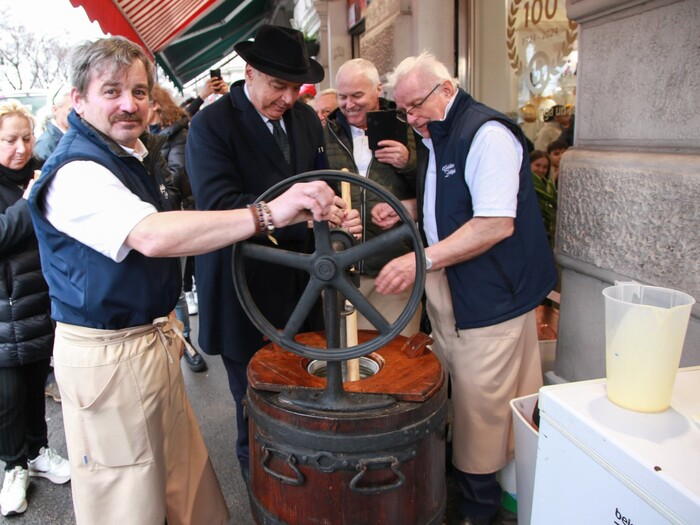Amid red-tiled single-family cottages lined the top of the tree-lined hill, as in any residential American suburb, the Turjeman supermarket bustles Thursday afternoon with
Sabbath
shopping
.
Jewish customers who speak English with an American accent rush to the checkout counter, where a display case full of Ben & Jerry's ice cream offers three tubs for NIS 49.90 (€ 13), an offer equivalent to three for two over the usual price.
"It's quite a dilemma," admits Sara, a 50-year-old lawyer, mother of six, who prefers not to reveal her last name. “At home we adore these ice creams; we lived in Chicago until seven years ago, ”she admits about her family's dependence on addictive flavors, wearing the turban that distinguishes married Orthodox Jews. "But we also believe that Judea and Samaria [Biblical denominations of the West Bank] is part of the promised land, of the land of Israel that God gave us in the Bible", rivet loaded with two bags that do not show Ben & Jerry's products .
The Turjeman supermarket is not located in the State of Illinois.
It is in Neve Daniel, 14 kilometers southwest of Jerusalem, in the Jewish settlement district of Gush Etzion that surrounds Bethlehem, a Palestinian territory occupied by Israel since 1967, with a separation wall. The decision of the American company that makes the popular ice creams to stop selling them - "for being incompatible with their values" - in the settlements in the West Bank, announced last week, seems to have left the settlers indifferent, who continue to buy them by the handful despite the call of the prime minister, the ultra-nationalist Naftali Bennett, to boycott the brand.
More information
Ice cream maker Ben & Jerry's plays its identity
When ice cream meets politics in Israel
The current broad-coalition Israeli government has created a working group dedicated to exerting "maximum pressure" on Ben & Jerry's to reverse its decision, as revealed by diplomatic analyst Barak Ravid on the Axios information portal. Israel fears that other foreign companies could follow in the footsteps of the US ice cream maker and abandon settlements in the West Bank.
The Ministry of Foreign Affairs has sent a classified cable to its diplomatic missions to launch a campaign of "public protests in the media" and exert "direct pressure on company executives", at the hands of Jewish organizations, groups pro-Israel and evangelical Christian communities.
"In the 18 months that remain until the decision (of Ben & Jerry's) takes effect, it is necessary to send messages to consumers and politicians in the press and social networks," reads the diplomatic cable.
Join EL PAÍS now to follow all the news and read without limits
Subscribe here
"As long as customers keep asking for them, I will continue to offer these ice creams"
"As long as customers continue to order them, I will continue to offer these ice creams," guarantees Moshe Turjeman, 71, owner of the Neve Daniel establishment. “No one has asked me to remove them. Quite the contrary. They are part of the lifestyle of the people in this community ”, he maintains, concerned by the debate that arose after the commercial plan,“ and they also employ many Israelis ”.
Bennett, who before becoming prime minister defended the political interests of the more than 650,000 settlers living in the occupied territories, including East Jerusalem, and declared himself a supporter of the annexation of the West Bank to Israel, has called it a “surrender to terrorism and anti-Semitism. ”The announcement by Ben & Jerry's not to renew the license to the franchised firm that has made ice cream tubs in two factories in Israel since 1987 —and also distributes them in the colonies— when it expires at the end of next year.
Israel has started a lobbying campaign for Unilever, the parent group of the ice cream company. The CEO of the Anglo-Dutch multinational, Alan Jope, has emphasized that "anti-Semitism cannot have a place in society", in a letter addressed to Jewish organizations in the US, headed by the influential Anti-Defamation League.
Unilever has rejected any link to the Pro-Palestinian Boycott, Divestment and Sanctions (BDS) movement.
In the US, 35 of the 50 states have passed laws against BDS.
Three years ago, the digital platform for tourist accommodation Airbnb withdrew from its offer on the web the more than 200 lodgings that it had registered in the West Bank with the aim of “avoiding suffering for the Palestinians”.
The company's decision was immediately contested in the US courts.
A few months later, Airbnb had to back down.
Violation of international law
The international community considers that the Israeli settlements lack any legitimacy. Security Council resolution 2334, approved in December 2016, establishes that Jewish settlements in occupied Palestinian territory constitute a flagrant violation of international law. The measure was voted on by all the members of the Council, then under the Spanish presidency, except for the United States, which abstained, but did not exercise the traditional right of veto in favor of the Jewish State. Israel replies that these are not occupied territories, but disputed areas over which the Jewish people have historical rights.
Ben & Jerry's was created in 1978 under the motto "peace, love and ice cream" in the State of Vermont, one of the most progressive in the US Among its principles, pacifism stands out, manifested in its opposition to the 1991 Gulf War .
Its founders were two Jews: Ben Cohen and Jerry Greenfield. Both have signed a recent tribune in
The New York Times
in which they proclaim themselves firm defenders of the Israeli State. "But it is possible to support him and question some of his policies," they warn in the text. "We support the decision of the company, one of the most important in our 43-year history, to end business in the occupied territories, which does not involve any boycott," they stressed. "We are Jews and we support Israel, but we categorically reject that questioning Israeli policy is anti-Semitism."
“We liked Ben & Jerry's ice cream so much that we even went to visit their first factory in Waterbury (Vermont) as a family,” recalls Sara, longingly, at Neve Daniel's supermarket.
"I think there is an undercurrent of hatred on the part of those who want to impose a boycott on us," says this business lawyer.
"We want to live here according to our faith and our ideas, and also Neve Daniel's houses are much more spacious and affordable," he concludes.
“But I still don't know what we will do with the ice cream.
That is our dilemma ”.
A divided society in front of the freezer
Israeli society is also divided by the ice cream tubs dilemma. In front of the more than 80 deputies, among the 120 seats in the Knesset (Parliament), who have signed a manifesto to impose a national boycott of Ben & Jerry's - "it violates the law of Israel", they warn -, about a hundred of Professors from the Hebrew universities of Jerusalem, Tel Aviv, Haifa and other Israeli academic centers have published a full-page advertisement in the
Haaretz
newspaper
to praise the decision of the American company: “Thank you for your commitment to Palestinian human rights. We want them to know that in Israel there are other opinions ”.
Much more stealthy than the ice cream company, the McDonald's subsidiary in Israel has so far refused to open restaurants in the occupied territories. Two years ago the UN published a blacklist of 112 companies doing business in Israeli settlements. The controversial relationship, promoted by the Human Rights Council as an extensible database, includes 94 Israeli companies. Among the foreigners, the US companies Airbnb and TripAdvisor or the European companies eDreams and Booking stand out, as well as the French industrial conglomerate of railway equipment Alstom.
A center of the Organization for Economic Cooperation and Development (OECD) in Spain has studied the project to expand the light rail or tram in East Jerusalem, in which the Basque company CAF (acronym for Construcciones y Auxiliar de Ferrocarriles) participates. after the complaint lodged by a pro-Palestinian association, which alleges that the new lines pass through Israeli-occupied territories. Its construction will also entail the forcible seizure of Palestinian land and, where appropriate, the eventual expulsion of its residents. Some of the main railway companies in the world, such as Siemens or Bombardier, withdrew from the tender for the project, supposedly not to face the consequences of being involved in such a controversial work.

/cloudfront-eu-central-1.images.arcpublishing.com/prisa/MYBIFIOGVRBRDN5YF2ZAWD4DOY.jpg)





